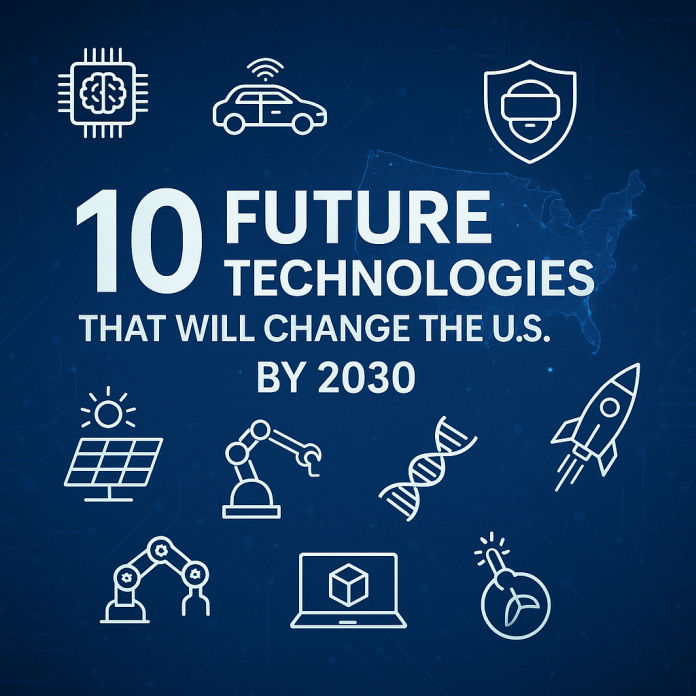The United States is entering a decade of unprecedented technological transformation. Many of the innovations once considered science fiction are becoming reality. By 2030, the U.S. economy, workforce, healthcare, security, and everyday life will be reshaped by powerful emerging technologies.
Here are the top 10 future technologies that will dramatically change America by the year 2030.
⭐ 1. Artificial Intelligence Everywhere (AI 2.0)
AI will be the backbone of nearly every industry in the U.S. by 2030.
Expected Transformations:
-
Fully automated customer support
-
Personalized education & healthcare
-
AI-powered cybersecurity
-
Smart AI agents assisting daily tasks
-
AI copilots for business, medicine, and research
AI will become more autonomous, more human-like, and deeply integrated into daily life — similar to having a digital assistant for everything.
⭐ 2. Self-Driving Cars & Autonomous Transport
By 2030, autonomous vehicles will be mainstream in major U.S. cities.
What’s Coming:
-
Driverless taxis
-
Autonomous delivery vans
-
Self-driving buses
-
AI-controlled logistics trucks
-
Smart traffic systems reducing accidents
Cities like San Francisco, Phoenix, Los Angeles, and New York are already testing autonomous fleets, and adoption will rapidly grow.
⭐ 3. 6G Networks & Ultra-Fast Connectivity
After 5G, 6G will bring speeds 50–100 times faster, revolutionizing communication.
Impact:
-
Real-time holographic calls
-
Smart factories with zero latency
-
AI-driven remote surgeries
-
Nationwide IoT connectivity
-
Instant cloud computing
This will enable the U.S. to build “intelligent cities” and hyper-connected communities.
⭐ 4. Quantum Computing
Quantum computers will solve problems that classical computers can’t — in seconds.
By 2030 they will impact:
-
Medicine discovery
-
National security encryption
-
Climate modeling
-
Advanced robotics
-
Financial systems
The U.S. government and companies like IBM, Google, and Microsoft are investing billions to stay ahead in the quantum race.
⭐ 5. Gene Editing & Personalized Medicine (CRISPR)
Biotech advances will redefine healthcare in America.
Expected breakthroughs:
-
Gene therapy for cancer
-
Treatment for rare genetic diseases
-
Personalized medicine based on DNA
-
Organ regeneration
-
“Disease prediction” using genetic data
CRISPR and gene therapy will make healthcare more preventive and personalized.
⭐ 6. Renewable Energy Innovations & Smart Grids
The U.S. energy sector will undergo dramatic changes.
Coming innovations:
-
Ultra-efficient solar panels
-
Advanced energy storage (solid-state batteries)
-
AI-managed smart electricity grids
-
Nationwide EV charging infrastructure
-
Hydrogen fuel development
By 2030, renewables will produce a major share of U.S. electricity.
⭐ 7. Robotics & Automation in Daily Life
Robots will become more human-like and capable.
You’ll see:
-
Service robots in restaurants & hospitals
-
Autonomous warehouse robots
-
Elder-care robots
-
Domestic helper robots
-
Robotic exoskeletons for disabled or elderly
Automation will redefine labor, increasing efficiency but also shifting job structures.
⭐ 8. Metaverse & Mixed Reality (MR/AR/VR)
The U.S. will see the rise of immersive digital environments.
How it will change society:
-
Virtual classrooms
-
Remote workplaces
-
Virtual tourism
-
3D shopping stores
-
Military and medical training simulations
Mixed Reality devices will blend physical and digital worlds seamlessly.
⭐ 9. Space Technology & Commercial Space Travel
The U.S. leads global space innovation — and it will accelerate by 2030.
Expected developments:
-
Affordable space tourism
-
Lunar mining programs
-
Private space stations
-
Satellite megaconstellations for internet
-
Hypersonic point-to-point Earth travel
Space companies like SpaceX, Blue Origin, and NASA partnerships will shape the future.
⭐ 10. Advanced Cybersecurity & Digital Identity Systems
By 2030, cyber threats will multiply — and so will advanced protection technologies.
Innovations:
-
AI-driven cyber defense
-
Quantum encryption
-
Deepfake detection systems
-
National digital ID frameworks
-
Cybersecurity automation
With more devices online, cybersecurity will be essential for national safety.
Conclusion
By 2030, the U.S. will be transformed by a powerful combination of AI, automation, biotech, space innovation, quantum computing, and hyper-connectivity. These technologies will redefine how Americans work, travel, heal, communicate, and interact with the world.
The next decade will be the fastest period of technological change in human history — and the U.S. will be at the center of it.



